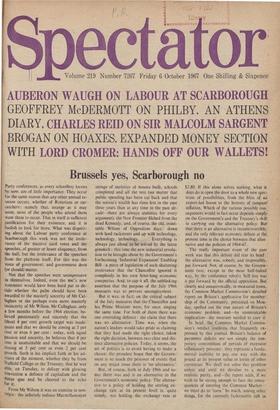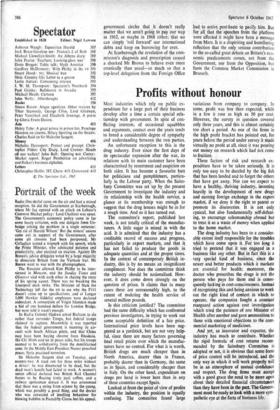Brussels yes, Scarborough no
Party conferences, as every schoolboy knows by now, are of little importance. They occur for the same reason that any other annual re- union occurs, whether of Rotarians or rat- catchers: namely that. strange as it may seem, most of the people who attend them want them to occur. That in itself is sufficient justification for their existence, and it is foolish to look for more. What was dispirit- ing about the Labour party conference at Scarborough, this week was not the irrele- vance of the massive card votes and the speeches, of greater or lesser eloquence, from the hall; but the irrelevance of the speeches from the platform itself. For this was the voice of government; and government does (or should) matter.
Not that the speeches were unimpressive in themselves. Indeed, even the aac's new votemeter would have been hard put to de- cide whether the palm should have been awarded to the masterly sincerity of Mr Cal- laghan or the perhaps even more masterly insincerity of Mr Wilson. Mr Callaghan, only a few months before the 1964 election, be- lieVed passionately and sincerely that the (then) 4 per cent growth target was inade- quate and that we should be aiming at 5 per cent or even 6 per -cent: today, with equal passion and sincerity, he believes that 4 per cent is unattainable and that we should he aiming at 3 per cent or even 2 per cent growth. Such is his implicit faith in his ad- visers of the moment, whether they be from Nuffield College or the Treasury, that he was able, on Tuesday. to deliver with glowing conviction a defence of capitalism and the status quo and be cheered to the echo for it.
From Mr Wilson it was an exercise in nos- talgia: the infinitely tedious Macmillanesque strings of statistics of houses built; schools completed and all 'the rest (no matter that public spending has been cut back and that the nation's wealth has risen less in the past three years than at any time in the past de- cade---there are always statistics for every argument); the New Frontier filched from the dead Kennedy: and, of course, the old, inimi- table Wilson of Opposition days : down with land racketeers and up with technology, technology, technology. . . . Everything is always just about to be solved by the latest gimmick : this time the new industrial revolu- tion to be brought about by the Government's forthcoming 'Industrial Expansion' Enabling Bill -a piece of legislation of such shattering irrelevance that the Chancellor ignored it completely in his own hour-long economic conspectus. And, to cap it all, the unblinking assertion that the purpose of the July 1966 measures was to prevent unemployment.
But it was, in fact, on the critical subject of the July measures that the Chancellor and his Prime Minister were, for once. singing the same tune. For both of them there was one overriding defence: the claim that there was no alternative. Time was, when the nation's leaders would take pride in claiming that they had made the right choice, taken the right decision, between two clear and dis- tinct alternative policies. Today, it seems, the art of politics is to avoid having to make a choice: the proudest boast that the Govern- ment is so much the prisoner of events that on any major issue there is 'no alternative.'
But, of course, both in July 1966 and to- day there was and is an alternative to the Government's economic policy. The alterna- tive to a policy of holding the sterling ex- change rate at its present level is, quite simply, not holding the exchange rate at The really important event of the past week was that this debate did rear its head : the alternative was, soberly and responsibly, put forward. Not, of course, by the Govern, ment (nor, except in the most half-baked: way, by the conference rebels). Still less was it put forward by the official opposition. But clearly and unequivocally, in measured tones, the Common Market Commission's detailed' report on Britain's application for member- ship of the Community, presented on Mon- day, spelled out the true nature of Britain's economic problem. and—by unmistakable implication—the measure needed to cure it.
In brief, the Common Market Comniis- sion's verdict confirms that frequently, ex- pressed by this journal. Britain's balance of payments deficits arc not simply the tem- porary concomitant of periods of excessive inflationary pressure: they represent a funda- mental inability to pay our way with the pound at its nresent value in terms of other currencies. We shall not solve this problem unless and until we devalue to a more realistic parity, and—the report adds, if we wish to be strong enough to face the conse- quences of entering the Common Market - we must do so 'soon.' So much, among other things, for the currently fashionable talk in government circles that it doesn't really matter that we aren't going to pay our way in 1967, or maybe in 1968 either; that we can simply 'roll forward' our international debts and keep on borrowing for ever.
At Scarborough the revelation of the com- mission's diagnosis and prescription caused a shocked Mr Brown to behave even more erratically than usual—so much so that a top-level delegation from the Foreign Office had to arrive, post-baste to pacify him. But for all that the speeches from the platform were affected it might have been a message from Mars. It is a dispiriting and humiliating reflection that the only serious contribution to the so-called great debate on Britain's eco- nomic predicaments comes, not from the Government, nor from the Opposition, but from the Common Market Commission in Brussels.



































 Previous page
Previous page